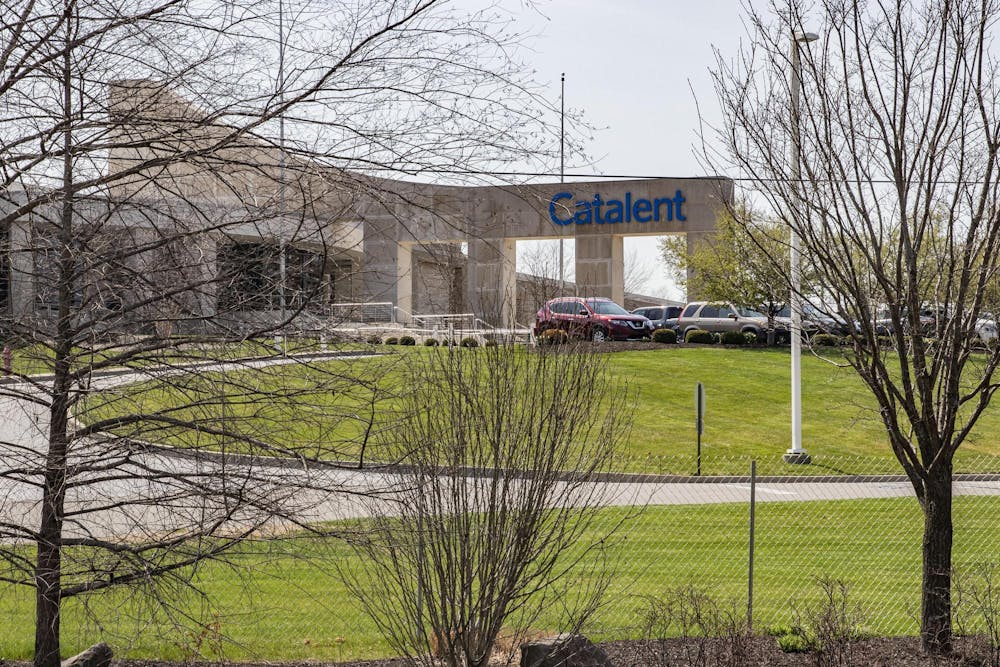UPDATE: The European Commission unconditionally approved Novo Holdings’ takeover of Catalent on Friday. The deal still will need Federal Trade Commission approval.
Years of layoffs and alleged mismanagement have left employees “sick” of the pharmaceutical contract manufacturer Catalent, one of Bloomington’s largest employers. As decisions near on Novo Holdings’ acquisition of the company, workers are hopeful for change.
But it’s unclear if that $16.5 billion deal will receive regulatory approval, though Catalent maintains it expects it to close before the end of the year. Many of the plant’s workers are in limbo, preparing for both possible futures.
Catalent did not respond when asked how many workers it has in Bloomington. An undated letter from the site’s general manager says it employs more than 2,400.
The acquisition by the Danish holdings company (owner of pharmaceutical giant Novo Nordisk) has attracted scrutiny from consumer watchdogs, the Federal Trade Commission and competitors. It needs approval from both the FTC and the European Commission. The latter is set to decide on Novo Holdings’ takeover by Dec. 6 and it’s unclear when the FTC will decide.
If the deal goes through
The Indiana Daily Student spoke with four Catalent workers granted anonymity to freely discuss concerns with the company and the acquisition to avoid retaliation. Each hope the takeover will go through.
That’s because of a sense of mismanagement over the past several years, and the instability of their jobs. The company has laid off hundreds in past years, most recently cutting 130 positions in March. Morale is on a constant decline, workers said.
“We continue to expect to close our pending transaction with Novo Holdings toward the end of the calendar year 2024 and look forward to the significant benefits the proposed transaction is expected to deliver for our employees, our customers and patients,” a Catalent spokesperson said in a statement when asked about allegations of mismanagement.
But there’s still uncertainty in the deal, which is weighing on workers at the Bloomington plant. Employees said Novo is considered a better company to work for, and they hope a culture shift hits the Bloomington plant.
Of course, the acquisition will precede a transition phase, meaning significant work getting Novo products and technology transferred on-site. But in the long term, employees are hopeful it will usher in a better culture and an improved workplace as a whole.
If the acquisition is blocked
It’s a mirror image for Catalent workers if the deal doesn’t go through. Employees expect an exodus of workers to other local pharmaceutical companies is possible.
One former employee said much of the company’s top talent has already left. They quit because of what they described as low procedural standards, inept leadership and a surge in unqualified hires.
The Food and Drug Administration found multiple quality control lapses at Catalent’s Bloomington plant in February, including a “pest” found on the manufacturing line. Regulators found other faults in other procedures, including ones designed to prevent contamination of sterile materials.
Regulators also found other safety breaches in 2021 and 2022. The former employee said the company has implemented “patch jobs,” stemming from leadership’s overall “cross that bridge when we come to it” mentality.
“It will only get worse for Catalent if this deal doesn’t go through,” they said in a text message to the IDS. “If the buyout is blocked, anyone holding out to help ensure a successful acquisition will cut their losses.”
Other workers expect further layoffs and a shrinking of the company’s operations toward its pre-pandemic size. Catalent declined to comment on whether it was preparing for layoffs in the case the deal is blocked.
Employees are also concerned Catalent’s clients may not renew contracts due to a lack of trust. Compounded with potential staff losses, workers are worried about the company’s future if it doesn’t go through.
The deal itself
Novo Nordisk, which is owned by Novo Holdings, will directly purchase the Bloomington location and two other fill-finish sites in Europe from its parent company. Catalent, a third-party manufacturer for pharmaceutical companies, already manufactures for Novo.
Amid the acquisition is a race for the development of GLP-1 drugs, now growing as diabetes and weight loss treatments. The major ones include Novo Nordisk’s Ozempic and Wegovy and Eli Lilly’s Mounjaro and Zepbound.
The industry is ballooning amid unprecedented demand; it’s projected to grow to about 15 million patients in 2030. That’s meant drug companies, Novo and Lilly included, are scrambling to bolster their manufacturing capabilities.
But competitors, including Lilly, have said the deal would undercut competition, as has Massachusetts Sen. Elizabeth Warren. Warren penned a letter to FTC Chair Lina Khan in early October, urging the organization to scrutinize it more closely.
“Limiting competition will further exacerbate the affordability crisis that is placing GLP-1s out of reach for many Americans,” she wrote.
Likewise, Eli Lilly is concerned with the acquisition — notably because the company claims it relies on a Catalent site for its own GLP-1 manufacturing. But Catalent and Novo have both denied the company manufactures Lilly’s GLP-1 drugs Mounjaro and Zepbound for “commercial sale.”
Reuters reported late last month the European Commission is set to grant unconditional approval to Novo Holdings’ takeover, a decision expected by Dec. 6. It remains unclear how the FTC will decide.




